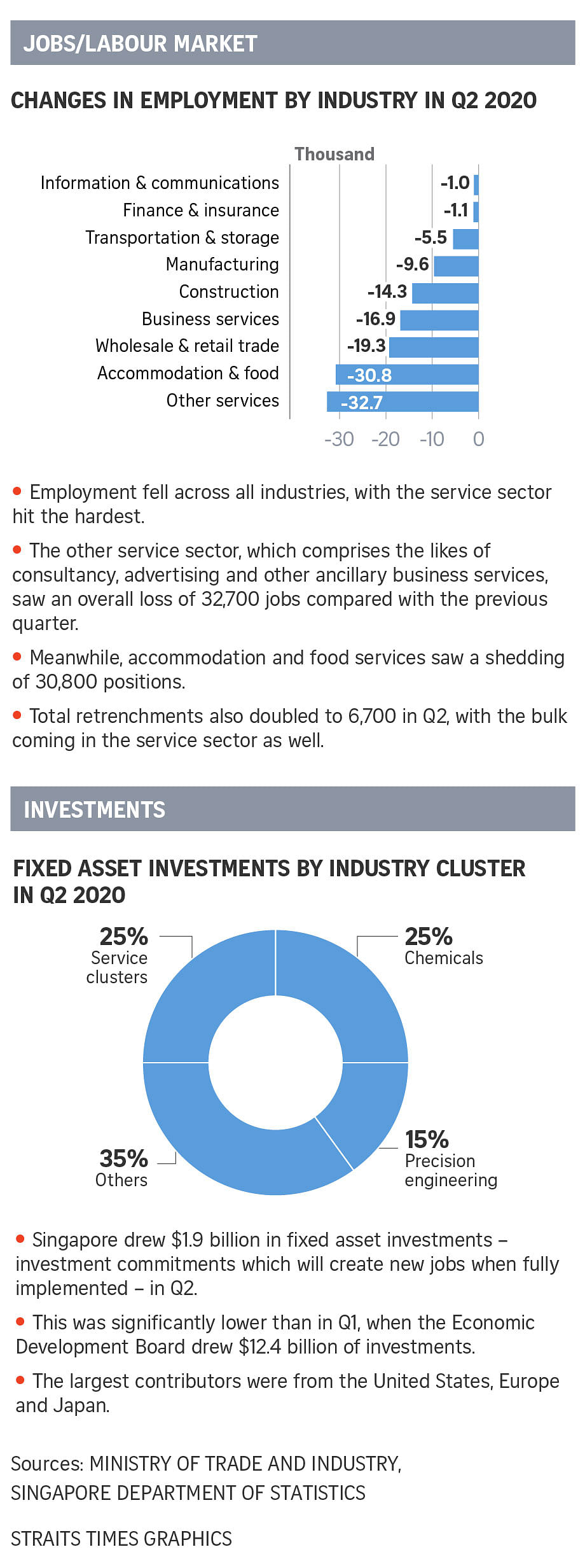With the circuit breaker in place from April to June, almost all sectors of the economy shrank.
Construction was hit the hardest, contracting by almost 60 per cent.
Movement restrictions on foreign workers and a pause on building projects meant that the sector was brought to a virtual standstill.
Also badly hit were accommodation, food services and air transport.
Visitor arrivals slumped by almost 100 per cent and air passenger traffic volume dived 99 per cent.
Food and beverage sales collapsed when dining-in was not allowed.
Finance and insurance was the lone bright spot, buoyed by continued demand for life insurance and reinsurance products.
Institute of Policy Studies senior research fellow Christopher Gee says that many businesses, especially those in the travel and hospitality sectors, will be forced to significantly restructure their operations.
He outlined two paths that firms can take.
First, they can consolidate by selling up or merging with similar firms to generate economies of scale.
Second, they can digitalise operations and make supply chains more resilient.
"Supply chains can be pruned, diversified or made more flexible to cope with market shocks that result from recurrent lockdowns and border closures," Mr Gee says.
Digitalisation journeys that may have otherwise taken years to complete will also be accelerated.
Universities around the world are a good example, Mr Gee says.
Already facing financial sustainability issues before the pandemic - due to an ageing population and shrinking student cohorts - they must now also contend with the rise of remote learning.
More people can be expected to ditch long and expensive on-campus degrees in favour of online courses that grant them the flexibility to upgrade their skills, one module at a time.
Closer to home, nearly a third of the 18,000 hawker stalls in Singapore now offer e-payments, after the Government launched the Hawkers Go Digital programme on June 8.
The aim is to get all of them to adopt the SGQR code digital payment solution by the middle of next year.
Singapore University of Social Sciences Associate Professor Walter Theseira hopes that such initiatives will lead to more fundamental change in business models.
The move to online sales is one example of what transformational change could look like, he says, explaining that it shifts businesses from bricks and mortar shops in the heartland to logistics facilities in industrial estates and moves workers from retail sales to online customer management.
"Moving to digital payments for hawkers doesn't change much at present, but if it could transform other aspects of the hawker business - such as the supply chain, which is reportedly quite relationship-based and cash-based - it might have bigger effects."
Singapore Business Federation chief executive Ho Meng Kit said that as there is no single situation facing all industries, there is no common response.
"Some companies should charge ahead and grow. Others will need to stay buoyant, buy time, preserve their core capabilities and rethink their business models," he said.
"Unfortunately, some will be better off exiting their businesses."
He expects any further government support to businesses to be less broad-based and more targeted, with a focus on helping them transform.
In this regard, he added, accelerating digitalisation is not just about government incentives and schemes, but also about firms committing to transforming themselves and creating new digital businesses.
Calls to reduce Singapore's reliance on foreign labour have also become louder.
Just two weeks ago, another 47 employers were placed on the Fair Consideration Framework for potentially discriminatory hiring practices.
Eighteen of the firms had foreigners comprising more than half of their professional, managerial, executive and technician (PMET) workforce, while 30 from the financial and professional services sectors had a high concentration of PMETs from single nationalities.
Association of Small and Medium Enterprises president Kurt Wee says a clear distinction should be made between discriminatory hiring practices and blue-collar jobs that Singaporeans shun, which have to be filled by foreigners.
He argues that the country risks losing a diversity of capabilities if the tap is completely turned off.
He says: "Businesses are happy to hire Singaporeans, but where they can't find a suitable local candidate, they need to hire foreign talent to complement their local workforce."
Prof Theseira asks whether Singapore's foreign labour policy has had distortionary effects, allowing firms here to cling on to less productive processes and businesses.
Citing the example of home repair works which are carried out by foreign technicians but supervised by locals, he asks: "How much lower are the charges for work done, just because we can rely on foreigners to do technical work rather than locals - as is the case in many developed countries?
"A skilled tradesperson will always find work, whether it's in Singapore, Bangladesh or New Zealand. But we have convinced ourselves that the skilled job is in fact the management of those persons, not the work itself."
Practice Associate Professor Tan Swee Liang of the Singapore Management University School of Economics says that while multinationals and foreign direct investment had driven up the demand and supply of skilled professionals in the past, the role of SMEs should be strengthened as part of an inclusive growth strategy - one that distributes growth more evenly and reduces concentration risk.
She cites Germany's Mittelstand as examples of how small and medium-sized firms can be technologically advanced and internationally competitive.
These firms, which export products ranging from machinery to chemicals, have benefited from Germany's apprenticeship schemes that provide a pipeline of skilled local workers.
Prof Tan also calls for more innovation, and a better balance between corporate profits and wages.
"Innovation is urgently needed to move up the value chain and offer products that command a price premium. Doing so will raise the real wages of resident workers," she says.





